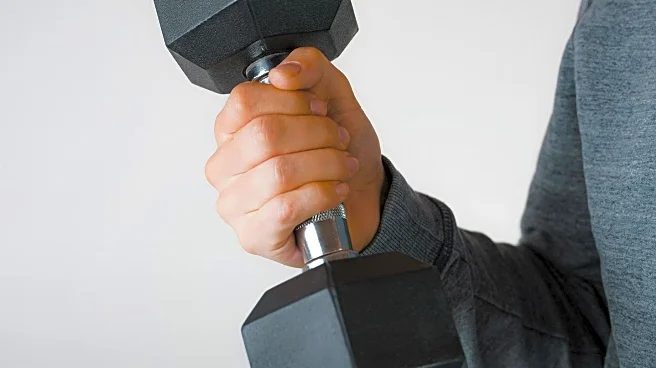What's Happening?
In a recent discussion on the Strong Talk podcast, fitness director Ebenezer Samuel and exercise physiologist Dr. Pat Davidson explored the relationship between grip strength and longevity. Studies have
shown a correlation between grip strength and reduced mortality risk, suggesting that individuals with stronger grips tend to live longer. However, Davidson emphasized that grip strength is more of an indicator of overall body strength rather than a direct cause of increased lifespan. He advised that strength training, including exercises like rows and deadlifts, naturally improves grip strength as part of overall fitness. Samuel added that everyday activities involving grip, such as opening jars or pulling objects, contribute to maintaining grip strength without the need for specific exercises.
Why It's Important?
The discussion highlights the importance of comprehensive strength training over focusing solely on grip-specific exercises. This approach benefits overall health and fitness, potentially leading to longer life expectancy. By emphasizing full-body strength training, individuals can improve their grip strength as a byproduct, which is crucial for daily tasks and overall physical health. The insights provided by Samuel and Davidson suggest that a balanced fitness regimen is more effective for longevity than isolated grip exercises, impacting how fitness enthusiasts and trainers might approach workout planning.
What's Next?
As the conversation around grip strength and longevity continues, fitness professionals may increasingly advocate for integrated strength training programs. This could lead to a shift in how gyms and trainers design workout plans, focusing on holistic strength development rather than isolated exercises. Additionally, further research may explore the specific types of grip strength that contribute most to longevity, potentially influencing sports training and rehabilitation practices.
Beyond the Headlines
The broader implications of this discussion touch on the cultural perception of fitness and aging. As society becomes more aware of the benefits of strength training for longevity, there may be increased interest in fitness programs tailored to older adults. This could lead to innovations in exercise equipment and training methodologies that cater to the aging population, promoting healthier lifestyles and potentially reducing healthcare costs associated with age-related physical decline.









